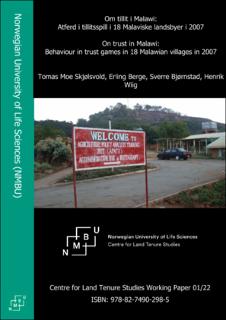| dc.contributor.author | Tomas Moe, Skjølsvold | |
| dc.contributor.author | Erling, Berge | |
| dc.contributor.author | Sverre, Bjørnstad | |
| dc.contributor.author | Henrik, Wiig | |
| dc.coverage.spatial | Malawi | en_US |
| dc.date.accessioned | 2022-01-24T04:59:28Z | |
| dc.date.available | 2022-01-24T04:59:28Z | |
| dc.date.issued | 2022 | |
| dc.identifier.isbn | 978-82-7490-298-5 | |
| dc.identifier.uri | https://hdl.handle.net/11250/2838798 | |
| dc.description.abstract | This paper originates from a series of “trust games” performed in Malawi during the summer of 2007. The results from the games are interpreted as pure stylized cases of a social dilemma. Some dilemmas, such as the prisoner’s dilemma, are more difficult to resolve than others. These are also called social traps. A group encountering a social trap can resolve it to the advantage of the group only by cooperation. The experiments were conducted in 18 villages, 6 from each of the 3 regions North, Centre, and South. Fifteen households from each village participated in the study. These were first interviewed, and later one person from each household was selected to play a trust game against another representative from the village. We lost a total of 3 players resulting in game results from 267 trust games. The interviews were analysed separately and provided the material for the construction of indexes by factor analysis (Berge et al. 2020a). The paper discusses the problems encountered in using this type of experiments. Economists specializing in experiments like this will often presume that results from a trust game are a good measure of general trust. The analysis of our data suggests that the game results measure actions. Actions that can be interpreted as demonstrating trust, but not trust as such. The trust games played are constructed as a social trap. The analysis of the data suggests that there is correlation between living in a village imbued by a culture of cooperation and the ability to avoid stepping into the trap in the game. All villages seem to be characterized by a culture of cooperation. Hence all players on average earn by participating in the game. But we also see that just as the theory predicts, the ego-centred players in a village with a high level of cooperation are the players who earn the most. By constructing indexes that characterize the context of each player we see that the ego-centred player earns most in villages located closer to an urban centre and where trust in relatives and family members are strongest. The winnings are somewhat less where trust in traditional authorities is stronger. The outcomes for these general relations are modified by the fact that the impact of the indexes is different in the different regions South, Centre, and North. | en_US |
| dc.language.iso | nob | No |
| dc.publisher | Norwegian University of Life Sciences, Ås | en_US |
| dc.relation.ispartofseries | CLTS Working paper;01/22 | |
| dc.rights | Attribution-NonCommercial-NoDerivatives 4.0 Internasjonal | * |
| dc.rights.uri | http://creativecommons.org/licenses/by-nc-nd/4.0/deed.no | * |
| dc.subject | Trust | en_US |
| dc.subject | Villages | en_US |
| dc.subject | Factor Analysis | en_US |
| dc.title | Om tillit i Malawi: Atferd i tillitsspill i 18 Malaviske landsbyer i 2007 | en_US |
| dc.title.alternative | On trust in Malawi: Behaviour in trust games in 18 Malawian villages in 2007 | en_US |
| dc.type | Working paper | en_US |

